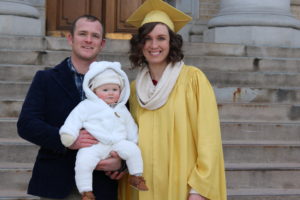At times, Miranda Epperson was bedridden for days or even weeks on end struggling with chronic illnesses. Since her early 20s, she has battled autoimmune disorders, gastrointestinal dysfunction, chemical sensitivities, food intolerances and chronic infections.
After moving to Fort Collins when she was 19, Epperson began working towards an A.A. degree at Front Range Community College. She transferred to CSU to study education, but in reflecting on some significant life challenges, she changed her major to human development and family studies.
 As a student, Epperson experienced health-related challenges including debilitating nausea, stomach pain, migraines, muscle and joint pain, fatigue and persistent flu-like symptoms. “Much of my class attendance, activity participation and homework time was overshadowed by struggling with symptoms,” said Epperson.
As a student, Epperson experienced health-related challenges including debilitating nausea, stomach pain, migraines, muscle and joint pain, fatigue and persistent flu-like symptoms. “Much of my class attendance, activity participation and homework time was overshadowed by struggling with symptoms,” said Epperson.
She began at CSU by taking one online class at a time. “The first step was a leap of faith, since I was often too ill to function or think clearly. That leap of faith characterized my entire career at CSU – always having to trust in God for the strength and energy I needed for the next week, the next assignment, the next semester,” she said.
Gradually, her symptoms improved over the course of a few years and she was able to increase her course load until she reached full-time status on campus. Her life was still consumed by her health treatments, doctors’ appointments, several surgeries and cooking and packing all of her own food to manage her special dietary restrictions. She improved greatly toward the end of her time at CSU, and then she learned that she and her husband were expecting their first child, presenting more challenges.
“I experienced intense and unrelenting pregnancy-related nausea throughout the entire nine months, which was very hard. Once again, physical suffering created a challenge in keeping up with coursework and remaining involved and engaged in my studies and the campus community,” she said.
In spite of all of her challenges, Epperson maintains a 3.98 GPA. She participated in Campus Connections as a mentor and served as an undergraduate research assistant in the Adolescent Wellness Lab. She also spent two semesters as a teaching assistant in the Department of Psychology. She served as secretary to the CSU Spoonies student organization – which is for students with chronic illness and the allies in their lives. The group was organized and founded during her time at CSU, and she was involved from the very first meeting onward. She is also a member of the Golden Key Honor Society.
Epperson credits her professors and other staff with supporting her and arranging special accommodations. She worked with Kathleen Ivy in Resources for Disabled Students, who was her counselor and student advocate there and was very helpful.
Faculty and staff in the Department of Human Development and Family Studies were also very supportive of Epperson, “I can’t think of a single HDFS faculty member, adviser, graduate student, or peer who didn’t attempt to meet me where I was at with kindness and flexibility,” she said. “Lauren Shomaker was wonderfully patient and accommodating in working around my needs and fluctuating availability due to health during the time I spent as a research assistant in her Adolescent Wellness Lab. My adviser, Amy Quinn-Sparks, was always a good sounding board for talking things through and re-evaluating my trajectory as needed. I’m grateful for all of the opportunities I was given!”
Epperson added, “Being in a major like HDFS that is focused on supporting individuals through varied experiences across the lifespan was not only a good fit for my future goals, but I believe it also provided a community that was prepared to embrace my challenges with greater understanding and empathy than might be found elsewhere.”
Epperson’s immediate plans include spending a year at home with her baby daughter, focusing on parenting with her husband, and further healing and recovery from her health challenges. After that, she hopes to find work in a capacity that involves helping others through difficult life challenges.
“My long-term goal is to attend graduate school and pursue additional training in nutritional and lifestyle supports for health and then become qualified as a counselor or psychologist. I would like to provide counseling in an integrative setting using a holistic approach that addresses the biological, social, spiritual and emotional components of mental health,” she said.
In the meantime, her faith continues to sustain her, “Christ is the center of my life, and I consider this accomplishment a miracle and a gift that He provided. I know that the strength to pursue and complete my degree came only by the grace of God,” she said.